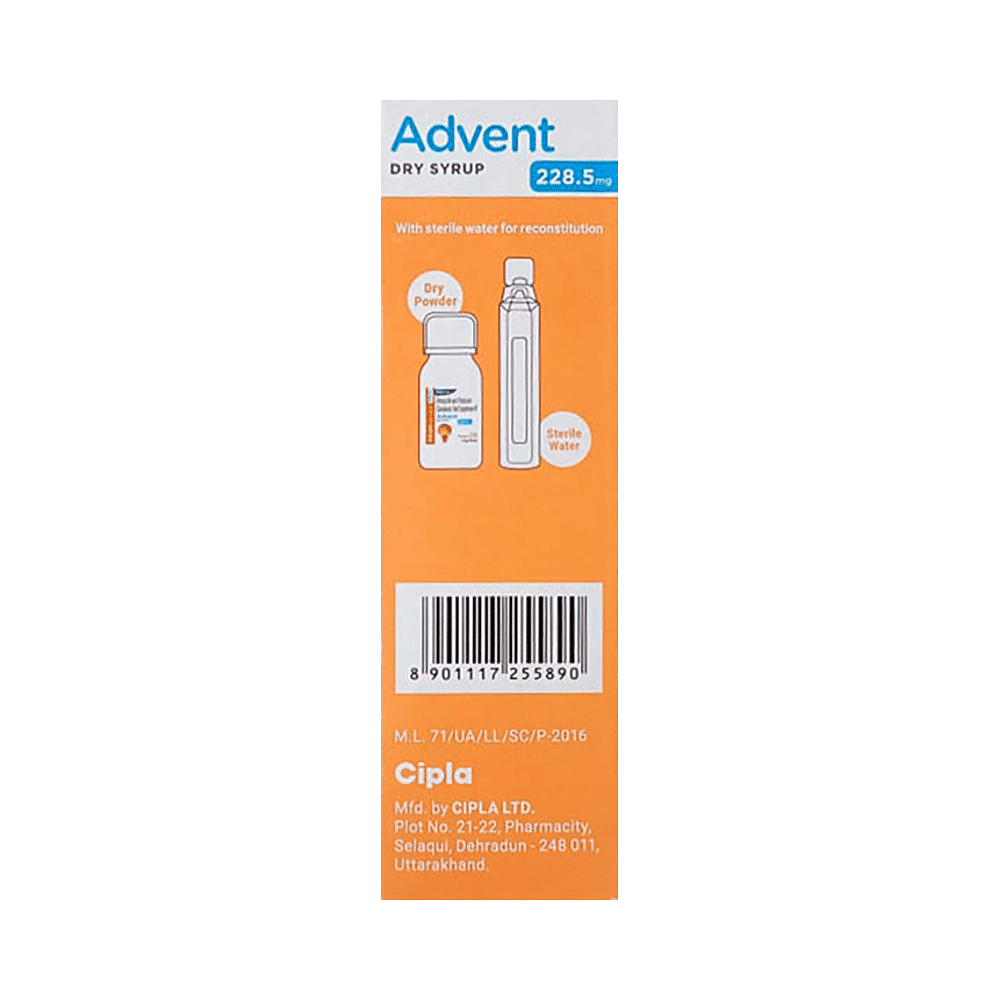
Iremox CV Dry Syrup
Manufacturer
Iretus Biotech Private Limited
Salt Composition
Amoxycillin (200mg/5ml) + Clavulanic Acid (28.5mg/5ml)
Key Information
Short Description
Iremox CV Dry Syrup is an antibiotic medicine that helps treat bacterial infections of the ear, nose, throat, chest, lungs, teeth, skin, and urinary tract.
Dosage Form
Dry Syrup
Introduction
Iremox CV Dry Syrup is an antibiotic medicine that helps treat bacterial infections of the ear, nose, throat, chest, lungs, teeth, skin, and urinary tract. It is capable of killing bacteria that have become resistant to other therapies and thus also helps treat tuberculosis that is resistant to other treatments.
Directions for Use
Your child must complete the entire course of antibiotics. Stopping too soon may cause the bacteria to multiply again or cause another infection.
How it works
Iremox CV Dry Syrup is an antibiotic. It has two active agents amoxycillin and clavulanic acid. Amoxycillin works by preventing the formation of the bacterial protective covering (cell wall) essential for the survival of the bacteria. Whereas clavulanic acid serves a special purpose of inhibiting an enzyme (beta-lactamase) that is produced by resistant bacteria. This makes the combination of amoxycillin and clavulanic acid an effective line of treatment for many types of infections.
Quick Tips
Your child must complete the entire course of antibiotics. Stopping too soon may cause the bacteria to multiply again or cause another infection. Encourage your child to drink plenty of water in case diarrhea develops as a side effect. Never give Iremox CV Dry Syrup until and unless prescribed by the doctor. Do not give Iremox CV Dry Syrup to treat common cold and flu-like symptoms caused by viruses. Check ‘expiry’ before giving Iremox CV Dry Syrup to your child. Immediately discard all the expired medicines.
Related Medicines

Advent 228.5mg Dry Syrup Tangy Orange

Lavimoxy Dry Syrup

Saumox CV Dry Syrup

Cimoxy Clav Dry Syrup

Elmoclav Dry Syrup

Xyclav Dry Syrup

Kramox CV Dry Syrup

Auxgo Dry Syrup

Moximit CV Dry Syrup

Decimet-CV Dry Syrup
Frequently asked questions
Can other medicines be given at the same time as Iremox CV Dry Syrup?
It is important to inform your child's doctor about any other medications or substances they are currently taking before starting Iremox CV Dry Syrup. Always seek guidance from your child's healthcare professional regarding potential interactions.
Can I get my child vaccinated while on treatment with Iremox CV Dry Syrup?
Antibiotics generally do not interfere with the ingredients of vaccines or cause adverse reactions in children who have recently been immunized. However, it is advisable to wait until your child has recovered from any illness before administering a vaccine. Once your child feels well, the vaccine can be administered.
Which lab tests may my child undergo while taking Iremox CV Dry Syrup on a long-term basis?
Periodic monitoring of kidney and liver function is often performed during extended treatment with Iremox CV Dry Syrup. This helps ensure the patient's overall well-being and allows for appropriate adjustments if necessary.
Can I give a higher than the recommended dose of Iremox CV Dry Syrup to my child?
It is not advisable to exceed the recommended dosage of this medication. Exceeding the prescribed dose can potentially increase the risk of side effects. If your child experiences a worsening of symptoms, please contact your child's doctor for further evaluation.
Can I stop giving Iremox CV Dry Syrup to my child when the symptoms are relieved?
It is not recommended to abruptly discontinue the medication without consulting a healthcare professional. The course of treatment should be completed as prescribed, even if your child feels better, as the medication may still be playing a role in clearing the infection.
Can Iremox CV Dry Syrup cause diarrhea?
Yes, Iremox CV Dry Syrup can sometimes induce diarrhea. This is because it targets harmful bacteria in your child's body. Additionally, the medication may disrupt the balance of beneficial bacteria in their stomach and lead to diarrhea. It is crucial for you to encourage your child to drink plenty of fluids if they experience diarrhea. If the symptoms persist, please consult your child's doctor as well to ensure there are no signs of dehydration. Do not administer any other medications without consulting a doctor.
Do all viral common colds result in secondary bacterial infection?
While most cases of viral infections do not lead to secondary bacterial infections, it's important to note that antibiotics are only prescribed after a thorough consultation with your child's doctor if there is an indication for such treatment. It's crucial to follow your doctor's guidance regarding the use of antibiotics.
The mucus coming out of my child’s nose is yellow-green. Is it a sign of a bacterial infection?
While yellow or green mucus in the nose can be a normal part of a common cold, it does not necessarily indicate a bacterial infection. During a common cold, nasal mucus often thickens and changes color from clear to yellow or green. However, symptoms typically persist for 7-10 days.
Is there any sign which shows that my child needs immediate medical attention?
It is essential to seek immediate medical attention if your child experiences signs of a serious allergic reaction (difficulty breathing, skin rashes), gastrointestinal distress (diarrhea), or liver damage (weakness, paleness, vomiting). These symptoms may indicate a more severe medical condition and require prompt intervention by a healthcare professional.


